University Essay: Changing Roles of Governments and Companies
VerifiedAdded on 2021/04/17
|6
|951
|432
Essay
AI Summary
This essay analyzes the evolving roles of governments and companies, focusing on the concept of Corporate Social Responsibility (CSR). It examines how companies are transitioning into responsible corporate citizens and collaborating with governments, while also addressing the increasing governmental control over corporate organizations. The essay discusses three articles that highlight the importance of CSR and the collaboration between businesses and stakeholders. It explores the strengths and weaknesses of these articles, including their insights into CSR adoption in various sectors like multinational corporations and small-scale enterprises. The essay emphasizes the need for companies to adopt CSR to achieve financial and environmental sustainability, gain stakeholder support, and navigate the complexities of the changing business landscape. It also points out the limitations of the articles, such as the lack of focus on consumer influence and stakeholder identification.
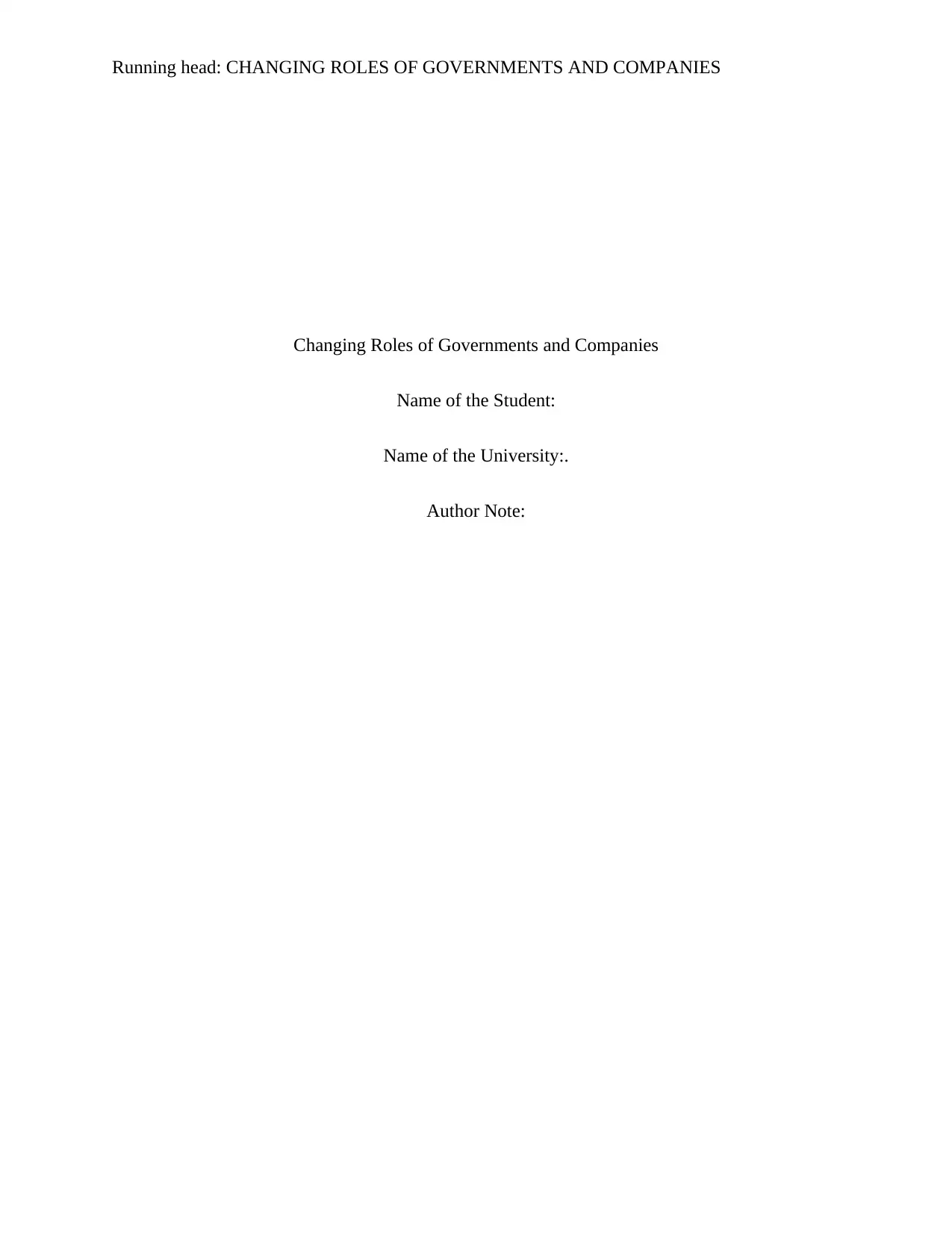
Running head: CHANGING ROLES OF GOVERNMENTS AND COMPANIES
Changing Roles of Governments and Companies
Name of the Student:
Name of the University:.
Author Note:
Changing Roles of Governments and Companies
Name of the Student:
Name of the University:.
Author Note:
Paraphrase This Document
Need a fresh take? Get an instant paraphrase of this document with our AI Paraphraser
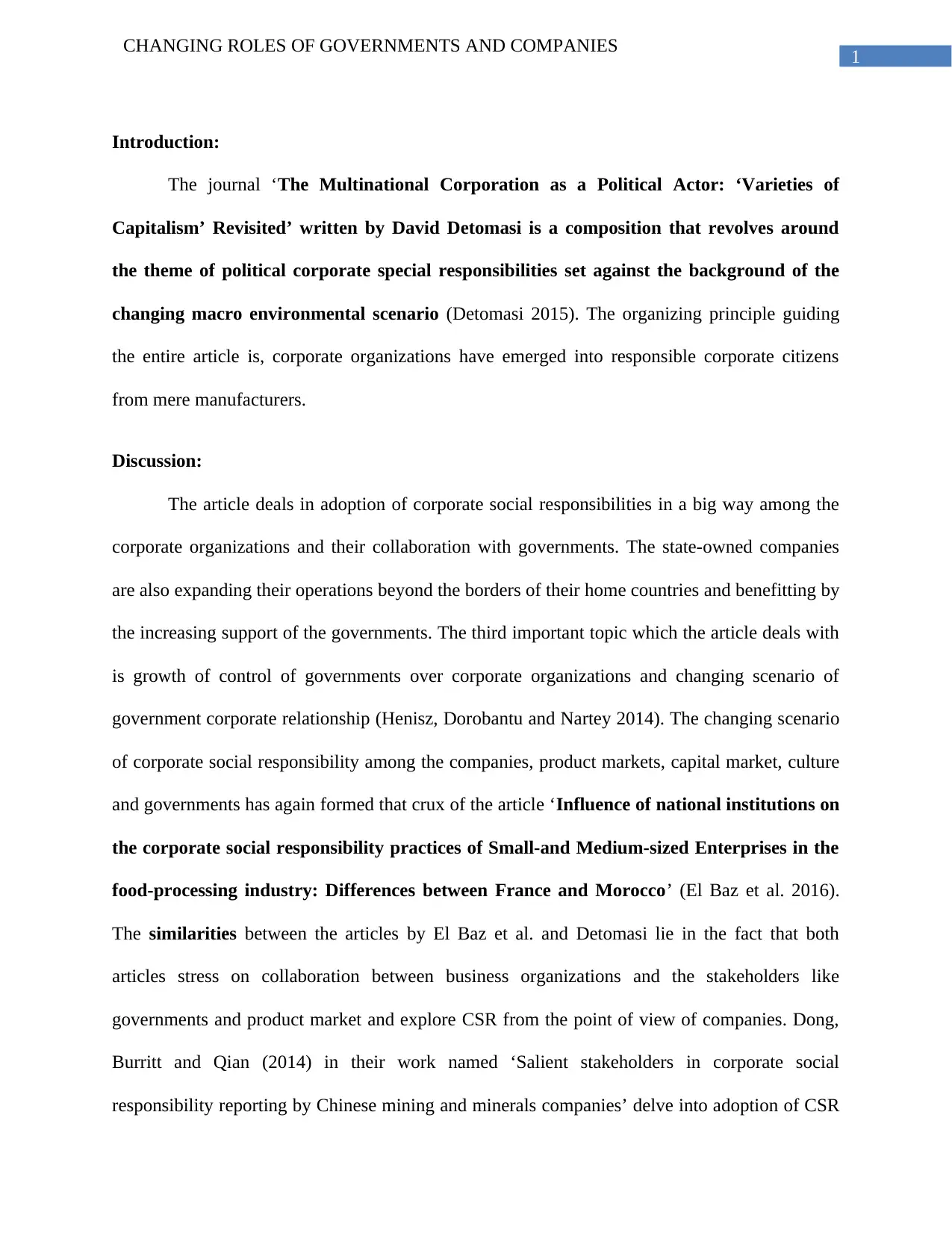
1
CHANGING ROLES OF GOVERNMENTS AND COMPANIES
Introduction:
The journal ‘The Multinational Corporation as a Political Actor: ‘Varieties of
Capitalism’ Revisited’ written by David Detomasi is a composition that revolves around
the theme of political corporate special responsibilities set against the background of the
changing macro environmental scenario (Detomasi 2015). The organizing principle guiding
the entire article is, corporate organizations have emerged into responsible corporate citizens
from mere manufacturers.
Discussion:
The article deals in adoption of corporate social responsibilities in a big way among the
corporate organizations and their collaboration with governments. The state-owned companies
are also expanding their operations beyond the borders of their home countries and benefitting by
the increasing support of the governments. The third important topic which the article deals with
is growth of control of governments over corporate organizations and changing scenario of
government corporate relationship (Henisz, Dorobantu and Nartey 2014). The changing scenario
of corporate social responsibility among the companies, product markets, capital market, culture
and governments has again formed that crux of the article ‘Influence of national institutions on
the corporate social responsibility practices of Small-and Medium-sized Enterprises in the
food-processing industry: Differences between France and Morocco’ (El Baz et al. 2016).
The similarities between the articles by El Baz et al. and Detomasi lie in the fact that both
articles stress on collaboration between business organizations and the stakeholders like
governments and product market and explore CSR from the point of view of companies. Dong,
Burritt and Qian (2014) in their work named ‘Salient stakeholders in corporate social
responsibility reporting by Chinese mining and minerals companies’ delve into adoption of CSR
CHANGING ROLES OF GOVERNMENTS AND COMPANIES
Introduction:
The journal ‘The Multinational Corporation as a Political Actor: ‘Varieties of
Capitalism’ Revisited’ written by David Detomasi is a composition that revolves around
the theme of political corporate special responsibilities set against the background of the
changing macro environmental scenario (Detomasi 2015). The organizing principle guiding
the entire article is, corporate organizations have emerged into responsible corporate citizens
from mere manufacturers.
Discussion:
The article deals in adoption of corporate social responsibilities in a big way among the
corporate organizations and their collaboration with governments. The state-owned companies
are also expanding their operations beyond the borders of their home countries and benefitting by
the increasing support of the governments. The third important topic which the article deals with
is growth of control of governments over corporate organizations and changing scenario of
government corporate relationship (Henisz, Dorobantu and Nartey 2014). The changing scenario
of corporate social responsibility among the companies, product markets, capital market, culture
and governments has again formed that crux of the article ‘Influence of national institutions on
the corporate social responsibility practices of Small-and Medium-sized Enterprises in the
food-processing industry: Differences between France and Morocco’ (El Baz et al. 2016).
The similarities between the articles by El Baz et al. and Detomasi lie in the fact that both
articles stress on collaboration between business organizations and the stakeholders like
governments and product market and explore CSR from the point of view of companies. Dong,
Burritt and Qian (2014) in their work named ‘Salient stakeholders in corporate social
responsibility reporting by Chinese mining and minerals companies’ delve into adoption of CSR
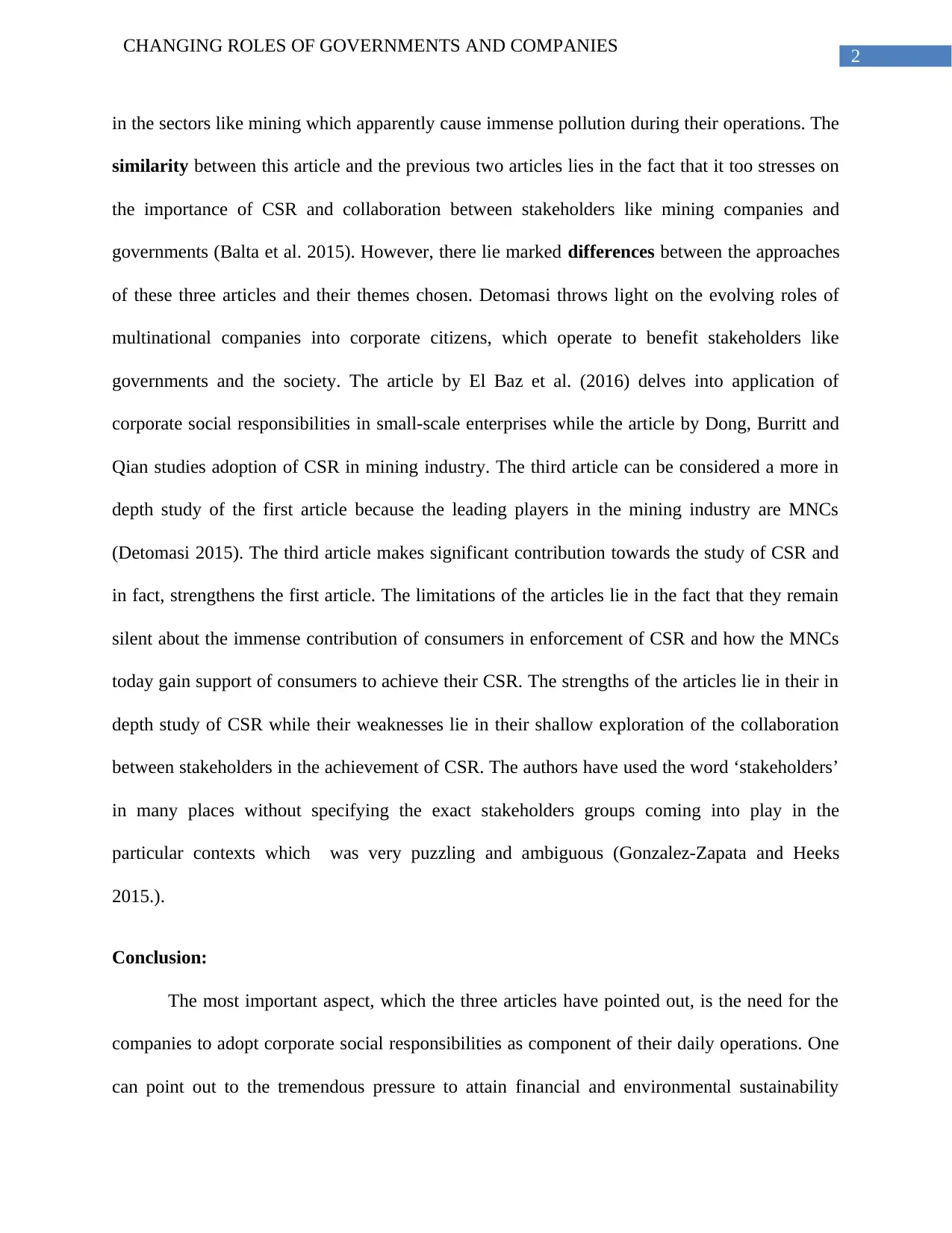
2
CHANGING ROLES OF GOVERNMENTS AND COMPANIES
in the sectors like mining which apparently cause immense pollution during their operations. The
similarity between this article and the previous two articles lies in the fact that it too stresses on
the importance of CSR and collaboration between stakeholders like mining companies and
governments (Balta et al. 2015). However, there lie marked differences between the approaches
of these three articles and their themes chosen. Detomasi throws light on the evolving roles of
multinational companies into corporate citizens, which operate to benefit stakeholders like
governments and the society. The article by El Baz et al. (2016) delves into application of
corporate social responsibilities in small-scale enterprises while the article by Dong, Burritt and
Qian studies adoption of CSR in mining industry. The third article can be considered a more in
depth study of the first article because the leading players in the mining industry are MNCs
(Detomasi 2015). The third article makes significant contribution towards the study of CSR and
in fact, strengthens the first article. The limitations of the articles lie in the fact that they remain
silent about the immense contribution of consumers in enforcement of CSR and how the MNCs
today gain support of consumers to achieve their CSR. The strengths of the articles lie in their in
depth study of CSR while their weaknesses lie in their shallow exploration of the collaboration
between stakeholders in the achievement of CSR. The authors have used the word ‘stakeholders’
in many places without specifying the exact stakeholders groups coming into play in the
particular contexts which was very puzzling and ambiguous (Gonzalez-Zapata and Heeks
2015.).
Conclusion:
The most important aspect, which the three articles have pointed out, is the need for the
companies to adopt corporate social responsibilities as component of their daily operations. One
can point out to the tremendous pressure to attain financial and environmental sustainability
CHANGING ROLES OF GOVERNMENTS AND COMPANIES
in the sectors like mining which apparently cause immense pollution during their operations. The
similarity between this article and the previous two articles lies in the fact that it too stresses on
the importance of CSR and collaboration between stakeholders like mining companies and
governments (Balta et al. 2015). However, there lie marked differences between the approaches
of these three articles and their themes chosen. Detomasi throws light on the evolving roles of
multinational companies into corporate citizens, which operate to benefit stakeholders like
governments and the society. The article by El Baz et al. (2016) delves into application of
corporate social responsibilities in small-scale enterprises while the article by Dong, Burritt and
Qian studies adoption of CSR in mining industry. The third article can be considered a more in
depth study of the first article because the leading players in the mining industry are MNCs
(Detomasi 2015). The third article makes significant contribution towards the study of CSR and
in fact, strengthens the first article. The limitations of the articles lie in the fact that they remain
silent about the immense contribution of consumers in enforcement of CSR and how the MNCs
today gain support of consumers to achieve their CSR. The strengths of the articles lie in their in
depth study of CSR while their weaknesses lie in their shallow exploration of the collaboration
between stakeholders in the achievement of CSR. The authors have used the word ‘stakeholders’
in many places without specifying the exact stakeholders groups coming into play in the
particular contexts which was very puzzling and ambiguous (Gonzalez-Zapata and Heeks
2015.).
Conclusion:
The most important aspect, which the three articles have pointed out, is the need for the
companies to adopt corporate social responsibilities as component of their daily operations. One
can point out to the tremendous pressure to attain financial and environmental sustainability
⊘ This is a preview!⊘
Do you want full access?
Subscribe today to unlock all pages.

Trusted by 1+ million students worldwide
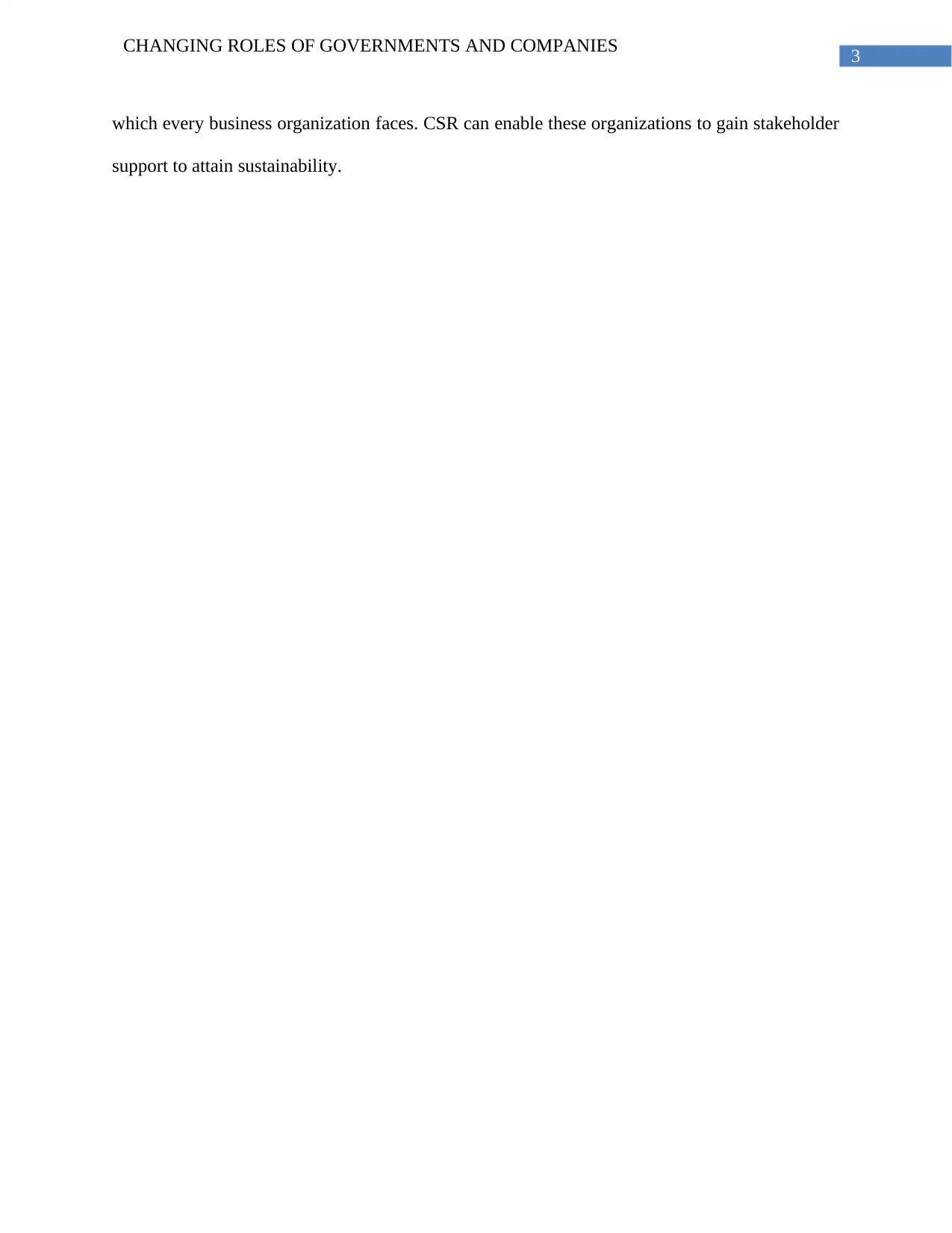
3
CHANGING ROLES OF GOVERNMENTS AND COMPANIES
which every business organization faces. CSR can enable these organizations to gain stakeholder
support to attain sustainability.
CHANGING ROLES OF GOVERNMENTS AND COMPANIES
which every business organization faces. CSR can enable these organizations to gain stakeholder
support to attain sustainability.
Paraphrase This Document
Need a fresh take? Get an instant paraphrase of this document with our AI Paraphraser
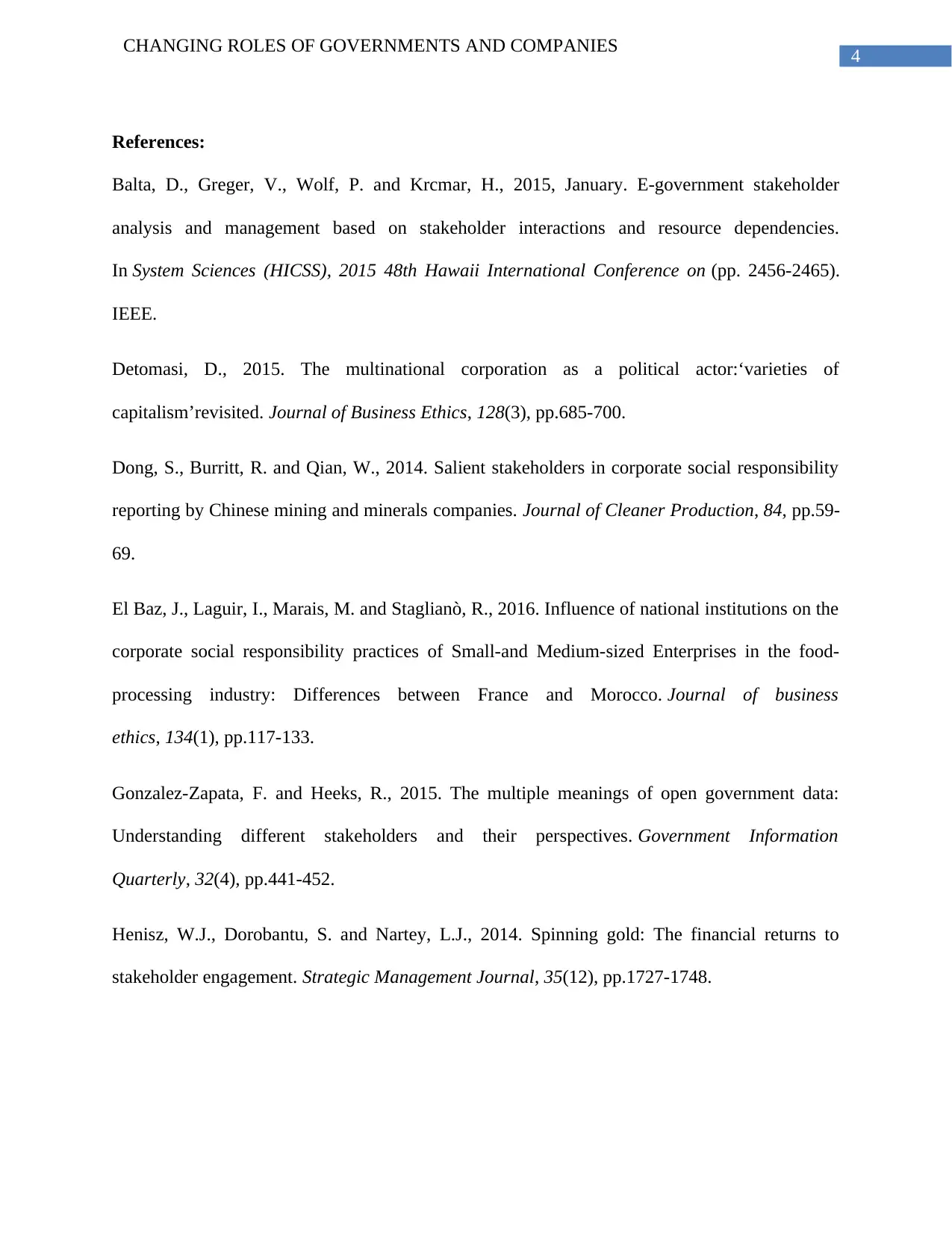
4
CHANGING ROLES OF GOVERNMENTS AND COMPANIES
References:
Balta, D., Greger, V., Wolf, P. and Krcmar, H., 2015, January. E-government stakeholder
analysis and management based on stakeholder interactions and resource dependencies.
In System Sciences (HICSS), 2015 48th Hawaii International Conference on (pp. 2456-2465).
IEEE.
Detomasi, D., 2015. The multinational corporation as a political actor:‘varieties of
capitalism’revisited. Journal of Business Ethics, 128(3), pp.685-700.
Dong, S., Burritt, R. and Qian, W., 2014. Salient stakeholders in corporate social responsibility
reporting by Chinese mining and minerals companies. Journal of Cleaner Production, 84, pp.59-
69.
El Baz, J., Laguir, I., Marais, M. and Staglianò, R., 2016. Influence of national institutions on the
corporate social responsibility practices of Small-and Medium-sized Enterprises in the food-
processing industry: Differences between France and Morocco. Journal of business
ethics, 134(1), pp.117-133.
Gonzalez-Zapata, F. and Heeks, R., 2015. The multiple meanings of open government data:
Understanding different stakeholders and their perspectives. Government Information
Quarterly, 32(4), pp.441-452.
Henisz, W.J., Dorobantu, S. and Nartey, L.J., 2014. Spinning gold: The financial returns to
stakeholder engagement. Strategic Management Journal, 35(12), pp.1727-1748.
CHANGING ROLES OF GOVERNMENTS AND COMPANIES
References:
Balta, D., Greger, V., Wolf, P. and Krcmar, H., 2015, January. E-government stakeholder
analysis and management based on stakeholder interactions and resource dependencies.
In System Sciences (HICSS), 2015 48th Hawaii International Conference on (pp. 2456-2465).
IEEE.
Detomasi, D., 2015. The multinational corporation as a political actor:‘varieties of
capitalism’revisited. Journal of Business Ethics, 128(3), pp.685-700.
Dong, S., Burritt, R. and Qian, W., 2014. Salient stakeholders in corporate social responsibility
reporting by Chinese mining and minerals companies. Journal of Cleaner Production, 84, pp.59-
69.
El Baz, J., Laguir, I., Marais, M. and Staglianò, R., 2016. Influence of national institutions on the
corporate social responsibility practices of Small-and Medium-sized Enterprises in the food-
processing industry: Differences between France and Morocco. Journal of business
ethics, 134(1), pp.117-133.
Gonzalez-Zapata, F. and Heeks, R., 2015. The multiple meanings of open government data:
Understanding different stakeholders and their perspectives. Government Information
Quarterly, 32(4), pp.441-452.
Henisz, W.J., Dorobantu, S. and Nartey, L.J., 2014. Spinning gold: The financial returns to
stakeholder engagement. Strategic Management Journal, 35(12), pp.1727-1748.

5
CHANGING ROLES OF GOVERNMENTS AND COMPANIES
CHANGING ROLES OF GOVERNMENTS AND COMPANIES
⊘ This is a preview!⊘
Do you want full access?
Subscribe today to unlock all pages.

Trusted by 1+ million students worldwide
1 out of 6
Related Documents
Your All-in-One AI-Powered Toolkit for Academic Success.
+13062052269
info@desklib.com
Available 24*7 on WhatsApp / Email
![[object Object]](/_next/static/media/star-bottom.7253800d.svg)
Unlock your academic potential
Copyright © 2020–2026 A2Z Services. All Rights Reserved. Developed and managed by ZUCOL.


